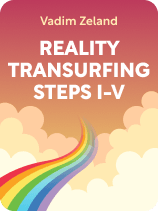

This article is an excerpt from the Shortform book guide to "Reality Transurfing Steps I-V" by Vadim Zeland. Shortform has the world's best summaries and analyses of books you should be reading.
Like this article? Sign up for a free trial here.
Do you feel stuck in life? Do you wish your reality were different?
In Reality Transurfing Steps I–V, Vadim Zeland argues that infinite versions of reality simultaneously exist—and what you identify as reality is just one version of it. The way you think and feel about your experiences determines which one of the infinite versions of reality exists for you.
Read more to learn about Zeland’s explanation for why you’re stuck in a reality you don’t want.
Reacting to Your Reality Reinforces Your Version of Reality
Your version of reality simply reflects your emotional energy. So, why aren’t you jumping between different realities every time your thoughts and feelings, and therefore your frequency, change? Zeland explains that you tend to get stuck in life—remaining in a single version of reality—for two reasons:
- You habitually transmit the same frequency.
- Realities require consistent emotional energy to materialize.
Let’s explore each of these two reasons in more detail.
Reason #1: You Habitually Transmit the Same Frequency
Zeland explains that, although the content of your thoughts and feelings often fluctuates, you’re still predominantly thinking about and reacting emotionally to what happens in your version of reality—thereby producing energy at the same frequency as your reality. This means that you’re continually feeding your version of reality, which is why it continues to materialize. For example, you don’t have enough money and feel bad every time you see something you can’t afford. As a result, you transmit emotional energy that matches—and therefore sustains—your “poor” version of reality.
(Shortform note: One reason you predominantly focus on your version of reality is that your thoughts and your state of mind reinforce one another to create an internal feedback loop. In this loop, your thoughts determine your state of mind (thinking about money makes you feel bad). Furthermore, your state of mind determines your thoughts (you feel bad, so you think about how unfair it is that you don’t have more money). However, research reveals that conscious reflection, whether through journaling or mindfulness practices, helps you develop the awareness to disentangle yourself from this feedback loop. This makes it easier for you to consciously redirect your thoughts and emotions to your ideal version of reality.)
Reason #2: Realities Require Consistent Emotional Energy to Materialize
According to Zeland, even if your emotional energy occasionally matches the frequency of a different reality, that reality won’t instantly materialize for you. This is because realities require a consistent stream of emotional energy to fuel the materialization process.
(Shortform note: Exactly how much emotional energy does it take for a different reality to materialize? According to Abraham-Hicks, it takes 17 seconds to kickstart the materialization process and 68 seconds to bring your desire into physical reality. Abraham explains that focusing on a singular thought for 17 seconds builds momentum around the materialization of that thought. It does this by inspiring thoughts and emotions that help you maintain a singular frequency. Once you maintain this singular frequency for a total of 68 seconds (Abraham clarifies that you achieve that by holding four thoughts for 17 seconds, one after the other), the reality that matches this frequency will instantly materialize.)
You Can Inadvertently Sustain a Reality You Don’t Want
Now that you understand how your emotional energy feeds a specific version of reality, let’s explore another side to this energy exchange that Zeland warns about: When you’re not conscious of the frequency you’re transmitting, you can inadvertently sustain a reality that you don’t want.
This can become a problem because, as Zeland explains, the more emotional energy a version of reality accumulates, the stronger and more self-sustaining it becomes. It sustains its physical form by creating circumstances that cause you to emit its specific frequency—that way, it can siphon your energy. And, in turn, the more you react to this version of reality’s circumstances, the more emotional energy you feed it—thus maintaining and further strengthening this reality’s physical form.
For example, a “poor” version of reality creates circumstances such as job loss, emergency medical expenses, and rising insurance rates to keep you focused on your lack of wealth.
| Controlling Where You Focus Your Attention Preserves Your Energy You might find it easier to understand how your version of reality steals your emotional energy by considering how often you react to your circumstances or give in to distractions. Each time you do this, you cede control over your attention and energy to your environment. For example, you want to focus your attention on a creative task, but your phone’s ringing. Reacting to your phone results in an unnecessarily long conversation. This distraction steals your energy and prevents you from focusing on the creative task. According to Neil Pasricha (The Happiness Equation), ceding control of your attention to your environment doesn’t make you feel happier or help you move toward what you want. This is because your environment encourages you to spend time on tasks and decisions that waste your time, deplete your energy, and gnaw away at your ability to focus on what you want to achieve. He suggests that you can take control of your attention and preserve your energy by focusing only on things that increase your happiness or help you achieve your goals. This involves eliminating the trivial tasks and decisions that currently waste your energy. Achieve this by automating regular tasks, removing unnecessary decisions, and limiting distractions. |
Self-Sustaining Realities Cause You to Lose Touch With What You Want
According to Zeland, when your reality pulls you into its frequency, you waste energy reacting to your circumstances. This leaves you with insufficient energy to become aware of and focus on your unique needs. In other words, you unconsciously focus on sustaining the reality you already live in instead of focusing on the version of reality you want to live in.
| Determining Your Values Helps You Focus on What You Want Jay Shetty (Think Like a Monk) offers additional insights as to why you might waste your energy on what’s happening in your reality rather than on what you want to experience. He argues that the degree to which you live in alignment with your values determines your ability to focus on your desired life experiences. According to Shetty, your unique needs, or what you need to be happy, can be summed up by your values: the core beliefs that you choose to live by. They determine who you want to be and how you treat yourself and others. However, the need for external validation causes you to adopt values that make other people happy. Shetty explains that, as a child, you learned to adapt your behaviors according to what others expected from you. When you conformed to their expectations, they validated and reinforced your behavior by rewarding you—and this made you feel happy. On the other hand, when you went against their expectations, they invalidated and discouraged your behavior by punishing you—and this made you feel unhappy. From these experiences, you unconsciously concluded that your happiness depends on pleasing others. This conclusion leads you to accumulate other people’s values and pursue things that you think will make you happy–without considering if these values align with your own. The downside to this is that your preoccupation with pleasing others distracts you from thinking about how you feel, what your unique needs are, and what makes you happy. As a result, instead of focusing your energy on what you want to experience, you allow others’ expectations to direct your energy—which, according to Zeland, is why you waste energy perpetuating realities that don’t reflect what you want. |

———End of Preview———
Like what you just read? Read the rest of the world's best book summary and analysis of Vadim Zeland's "Reality Transurfing Steps I-V" at Shortform.
Here's what you'll find in our full Reality Transurfing Steps I-V summary:
- How you can control which version of reality you live in
- Why some realities materialize while others lie dormant
- The three methods for redirecting your emotional energy







Thanks for this amazing article Elizabeth. I feel stuck in my life but will try your way to get up so fingers crossed.